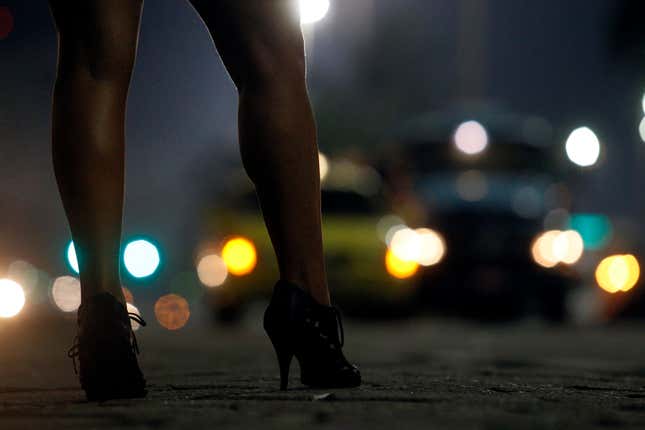
I came out rather late, while I was serving in the military, hundreds of miles away from my parents, siblings and children. I was stationed in Fort Myers, Virginia, and I worked part-time in Washington, D.C. This was also the time when I started transitioning and doing sex work. Since then, I have seen thousands of black and brown LGBTQ people tossed into the streets for being themselves, often as teenagers. And, honestly, the same or worse may have happened to me had I came out when I wanted to.
My first time in a shelter was in 1990, at Community for Creative Non-Violence (CCNV) on D Street, the largest homeless shelter in the Washington, D.C. area. It was winter and I was alone with very little, but soon some welcoming people found me and took me in as a member of their small but tight-knit family. I have become a mother figure or an aunt to many since then, countering the violence and trauma so many of us have endured.
Many of the older girls at this shelter (I was 23 back then and many others were 18, 19 years old) did sex work to keep ourselves up and to take care of family—real and acquired. We did whatever fed us and put money in our pockets so we could survive. Some of us survived and are here to tell the tale, but many more are not. I mourn them still as if they were like my own much-loved children.
It was also around this time that I had my first negative encounter with the Washington, D.C. Metropolitan Police Department (MPD). I was arrested and thought I was going to jail, but I was released after I was raped. The officer then stole $20 dollars from me. I was disgusted that someone I thought was supposed to protect me violated me instead. I would rather go to jail than to be sexually assaulted. And that was just the first time. These experiences eventually became what I called “doing my community service.” I was not the only one who had to endure this abuse of power, and it is still prevalent.
Knowing that very history, we have an opportunity to right a long-standing wrong that will bring about safety and increase the health of our community. Supporting the movement to decriminalize Adult Consensual Sex Work is central to gender justice and stops adding significant numbers to the ever-growing mass incarceration issue. Consenting adults do adult things, and having sex is one of them. Punishing someone for having consensual sex because money or other resources have been exchanged is ludicrous. This, especially since it has been the only way many of our family members have had to support themselves, doing whatever is necessary to survive.
Decriminalizing sex work is an opportunity to restore freedom and autonomy over our bodies. Supporting choice, freedom, and liberty is what this country is supposed to be about, and not allowing government to find and utilize more ways to control our individual bodies that interfere with our rights and liberties guaranteed by the Constitution. Understanding why I need this freedom is not about me, it’s about another element to free black and brown bodies from tyranny, oppression, and control.
Criminalizing our communities has never been the answer. The devastation from the failed war on drugs is now a booming industry for white gentrifiers throughout D.C., while our family and friends are still locked up for nonviolent drug-related charges. Policy has changed in many states and Washington, D.C. around marijuana and especially opioids, in response to a crisis that big pharma started. It has resulted in the kinder and gentler approach to addiction for the vast number of white rural and suburban Americans even though these issues have long plagued inner cities, and did not garner a similar policy response.
If you have had your fill of people of color being overcriminalized, brutalized, assaulted and murdered by police, it’s time to support DecrimNow (DecrimNow.org), and the Community Health and Safety Act of 2019. It’s time for MPD to move away from ineffective and counterproductive policing efforts that increase violence against trans women of color, and for the city to step in with vital resources that foster stability. It’s time to offer public and affordable housing and jobs for marginalized people in an ever-gentrifying city.
Targeting black and brown people, LGBTQ people, people experiencing homelessness, those with unmet mental health needs, drug users and sex workers does not make our communities safer. We as a village can do that and mitigate the state-sponsored violence.
I am grateful to have made it to 50-something, with over 37 years of sex work experience, having survived sex work proabtion, but also the infamous “War on Drugs,” as I also outlasted addiction. Many of my friends and sisters weren’t so fortunate and even in death, their families of origin would not claim them. Having seen and experienced this devastation, we as a community are constantly healing ourselves from the wounds life has put upon us. This is something we need the whole black and brown community to help us with: healing our own. It is no coincidence that of the candidates running for president in 2020, only the two African Americans— Sen. Kamala Harris and Sen. Corey Booker—are for decriminalizing sex work.
The narrative of sex work and criminality needs to shift so we can be that village to all our neighbors, friends and family. D.C. is better than cuffing and jailing people for trying to survive. I always ask myself, what would Jesus do? The answer has always been, he would work to let his people go. Food for thought…
Tamika Spellman is a 52-year-old transgender woman of color working as an Advocacy Associate for HIPS in Washington D.C. Spellman has 37 years experience as a Consensual Sex Worker and HIPS representative with the Sex Workers Advocacy Coalition (SWAC) who are working to decriminalize sex work in Washington D.C.

